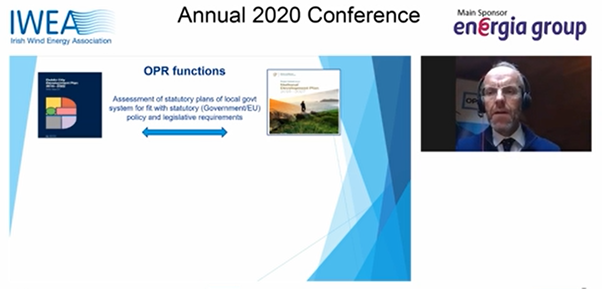A co-ordinated approach on renewable energy across the next generation of local authority development plans and across their boundaries is critical for Ireland to achieve its renewable energy targets, the Planning Regulator, Niall Cussen has told the Irish Wind Energy Association (IWEA) conference. A key building block for that co-ordinated approach is to finalise long-delayed new Government planning guidelines on wind energy and renewable energy as soon as possible.
Ireland’s Climate Action Plan includes an ambitious target to deliver 70% of Ireland’s electricity from renewable energy by 2030. Currently, around 37% of our electricity needs are from renewable sources.
Speaking to delegates, the Planning Regulator explained that a critical area of focus for the new Office of the Planning Regulator, (OPR) when independently assessing local authority development plans is on their practical actions on climate change. This includes moving away from objectives which depend on car based mobility as well as identifying how renewable energy solutions can be rolled out in line with wider environmental considerations.
Mr Cussen said;
“The OPR will be assessing all local authority plans in the coming two to three years. One feature of these plans which we will focus on within our assessments are their contribution to delivering on national climate change targets like the jump to 70% renewable electricity by 2030. If we feel that new local authority plans are not delivering sufficiently, we will ask the local authorities to go back and re-visit their plans and if that doesn’t work, it would be likely that we will use our statutory powers to ask the Minister for Housing, Local Government and Heritage to direct them to take the necessary steps.
On a more positive note, one approach which might be particularly effective in helping to achieve renewable energy targets is co-ordinated, joint-up policy on the issue between local authorities. A collaborative regional approach to challenges such as on-shore wind energy production could mean that projects with the potential to produce renewable energy can be more effectively realised.
A co-ordinated approach may also help communities better appreciate both the necessity and requirement to reduce our reliance on carbon and how well-managed renewable energy projects can contribute to this.”
The OPR has responsibility for independently assessing all statutory forward planning with a view to ensuring that the plan provides for the proper planning and sustainable development of the area concerned.

